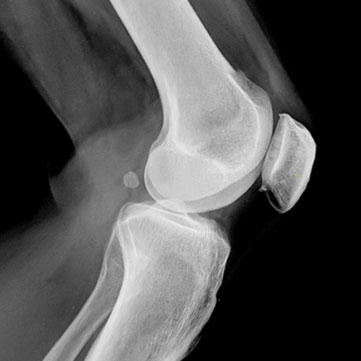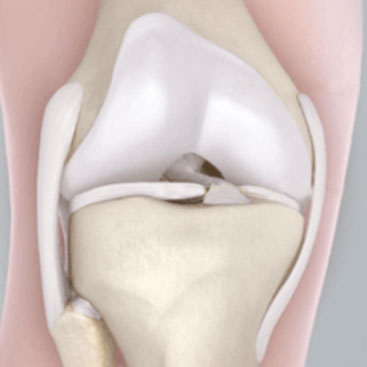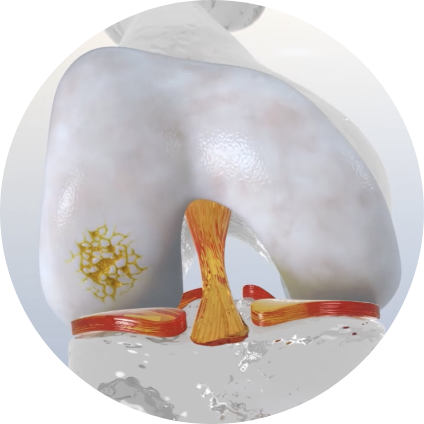How your knee works
Your knee is a complex joint serving as the meeting point for three major bones: the tibia (shin bone), the femur (thigh bone), and the patella (kneecap). In order for your knee to flex freely, articular cartilage must protect where hard surfaces come into contact.

- Patella
Knee cap - Tibia
Shin bone - Femur
Thigh bone
Healthy cartilage is critical for protecting your knees
Cartilage is a strong, rubbery tissue found in many parts of the body, including joints. There are two types of cartilage found in the knee:

- Meniscus
-
Articular Cartilage
Healthy cartilage is critical for protecting your knees
Cartilage is a strong, rubbery tissue found in many parts of the body, including joints. There are two types of cartilage found in the knee:
- Meniscus—acts as a cushion between the knees
- Articular cartilage—covers the ends of the bones to ensure smooth movement

When cartilage is damaged, it no longer functions well to provide a smooth, impact-resistant coverage of your bone during activities such as walking, kneeling, running, and jumping.

Cartilage does not heal on its own
Unlike other tissues, cartilage does not naturally regenerate. That’s why cartilage injuries are chronic and frequently get worse as time goes on. In a study of patients undergoing cell-based knee cartilage restoration, it was shown that cartilage damage can progress and new defects can form as time between cartilage biopsy and implantation increases.1
Cartilage defect expansion1
0.6 cm² mean change in defect size between biopsy & implantation
New high-grade cartilage defects1
16.2% of patients developed a new high-grade cartilage defect between biopsy & implantation

77% of knee pain sufferers say they can no longer participate in at least one activity they previously enjoyed because of knee pain.2
How cartilage can be damaged
Chronic or repetitive actions
Exercise, sports, or physical work can cause cartilage to weaken and wear over time.

Acute or traumatic events
Falls and accidents can cause immediate and severe cartilage damage.
Are you ready to learn more about your knee pain?
Not sure what your knee pain is telling you? Take this short quiz to see how much it affects your life.

Reference: 1. Pettit RJ, Everhart JS, DiBartola AC, Blackwell RE, Flanigan DC. Time Matters: Knee Cartilage Defect Expansion and High-Grade Lesion Formation while Awaiting Autologous Chondrocyte Implantation. Cartilage. 2021 Dec;13(2_suppl):1802S-1808S. 2. Data collected from a 2019 Harris Poll survey of 1,002 US adults with knee pain 3 or more days a week that has lasted 2 months or more. 3. Gomoll AH, et al. Surgical management of articular cartilage defects of the knee. J Bone Joint Surg Am. 2010 Oct 20;92(14):2470-90.


